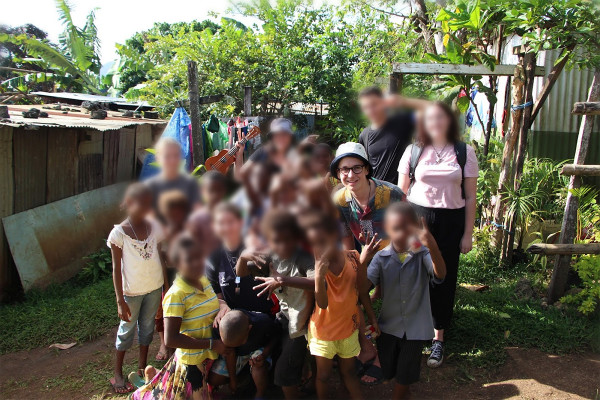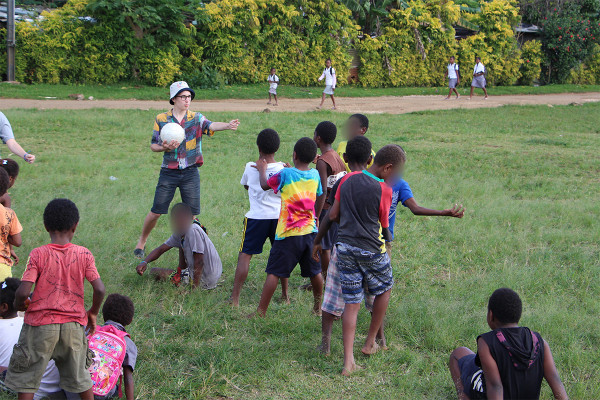By Maggie Shui
Marek had just turned 16 when he found himself bandaging wounds and testing blood sugar levels of local people in a village near Vanuatu’s capital Port Vila.
He was there on a volunteering trip organised by his high school during the July school holidays.
Students spent four days out of the two-week trip on this medical work, another three days “playing with kids at the school up the road”, and the remaining week at the beach, visiting markets and shopping.
Marek felt like the volunteering aspect of the trip was “mostly a performance act”.
Marek on his volunteering trip
“The things we performed were merely Band-Aid-like quick fixes that were helpful, but they lacked any real long-term benefits for the locals.”
Marek says the moment that made his “jaw drop” was when they returned to school, the supervising teacher told them they couldn’t show all their photos from the trip “as it will look more like a holiday than a ‘mission trip’”.
The teacher instead shared a powerpoint with the “approved” photos.
“It was for the school's ego and our own egos more than anything,” Marek says. “It was a glorified holiday.”
The changing face of voluntourism
Voluntourism combines travelling with volunteering, with the idea that you can ‘give back’ to the places that you visit.
The volunteering is usually short-term and can involve work like teaching English, manual labour, helping out at an orphanage or, in Marek’s case, a medical brigade.
But the concept has been criticised for similar issues to the ones Marek raised: the short period of time does not always allow for any meaningful engagement and work beyond “Band-Aid quick fixes”, and it can be more about serving the tourists rather than the local people.

Marek playing with local kids during his volunteering trip
Orphanage visits in particular have been scrutinised for potentially causing harm to children and, with voluntourism programmes often coming with an expensive price tag, there are concerns it turns volunteering into a business with profit as the focus instead of helping the local community.
In light of this criticism, volunteer tourism has started framing itself less as a practice of ‘doing good’ and more as ‘cultural exchange’, say Massey University researchers Sharon McLennan and Johanna Thomas-Maude.
In a recent study for the Journal of Hospitality and Tourism Management, they found there’s a growing perspective that voluntourism can be “a form of mutual giving and receiving”.
But overall, the researchers say they found in practice the concept raises some “significant questions about justice, equity, and cultural understanding”.
So is ethical volunteer tourism possible?
Here are some questions you can ask yourself to check your intentions and the value of the volunteering work you want to do, guided by McLennan and Thomas-Maude’s case study research in Fiji and Peru.
How much money and time are you spending?
McLennan and Thomas-Maude say one major red flag is spending thousands of dollars on a volunteering programme.
In such cases, volunteering becomes a product that is being sold to you, and commercial considerations can override what’s supposed to be the purpose of volunteering: to benefit the community.
Spending a few hundred dollars towards admin for a locally-run organisation is a more promising sign than a few thousand dollars towards an international volunteering organisation.
When it comes to time, however, McLennan and Thomas-Maude say the more you can spend, the better.
Are you the best person to do this work?
You’ve found a local organisation that seems to be focused on benefiting the community rather than mining the good intentions and CV-building aspirations of young people in their gap years for profit.
McLennan says you should then ask yourself if you’ve got the skills to be doing the volunteer work.
One useful test is to ask if it’s the kind of work you’d also be doing at home – for example, a doctor volunteering in a medical brigade in a place that has a medical worker shortage.
She also says to “be careful that you're not taking somebody else's job”.
Otherwise, you’d be doing work for free that local people can be employed to do for themselves.
Simon Birkenhead, CEO of New Zealand-based volunteering company International Volunteer HQ, says that the projects they support cannot afford to pay locals to do the work.
“Our volunteers don't take jobs away from locals – instead they create local employment that wouldn't exist otherwise.”
McLennan argues that if these local projects cannot afford to hire locals, it is more sustainable in the long term to raise funds to help them train and employ locals.
Raising funds, however, just “isn’t as sexy” and is more difficult than recruiting “volunteers for an exciting adventure”, she says.
Is teaching English the exception?
Thomas-Maude says that English teaching is a common form of volunteer work that people often assume they are well-suited to do.
“It's a little tricky because you can say, ‘Well, I do use English language in my daily life. So it is a skill I have.’”
However, she says “there is a difference between speaking English and teaching English”.
She says volunteering in English teaching can be successful when the volunteer is assisting local staff, but that people shouldn’t assume because they’re a native speaker, they’re equipped to teach a class themselves.
“It can be potentially harmful if you're showing up and have zero teaching, training or experience and you're just running a whole class.”
Birkenhead says that some of International Volunteer HQ’s programmes only accept volunteers who have relevant skills and experience.
For other projects, he says the local organisation where the volunteering takes place will provide any other necessary training.
On their website, the volunteers complete “some relevant training” such as a Teaching English as a Foreign Language (TEFL) course.
But this is not a strict requirement, and volunteers as young as 13 years old are able to take part if they’re accompanied by a parent or guardian.
Should this work even be done?
McLennan suggests you do the research to see if the skills you’re bringing are useful and match what is needed in the community.
Thomas-Maude says that when it comes to English teaching, there’s an assumption that if you help people learn English, “their lives are going to be better”.
She says it’s an assumption that “really needs to be challenged and questioned”.
In her case study where British university students volunteered to teach English at a private school in Lima, Peru, she says Peruvian students and parents welcomed the programme and found the English teaching useful.
However, she says they made comments like “Oh, if you speak English, it doesn't matter if you actually can use it for your job, you're more likely to get hired just because you speak English.”
“There is this relationship to the English language itself that has roots in colonialism.”
In Peru, at least 37 indigenous languages have become extinct.
While English is the lingua franca of the world and can have an economic benefit for people, Thomas-Maude says it’s helpful to ask what you’re contributing by teaching and spreading the English language.
How equal is the ‘cultural exchange’?
McLennan and Thomas-Maude found that while cultural exchange was considered central to the volunteering programmes in their case studies, this was inevitably on an unequal basis.
In McLennan’s case study in Fiji, volunteers stayed with local host families, and paid a fee to the volunteer agency that was then allocated to the hosts.
She says this affects the relationship dynamic between volunteers and their hosts, and “unsettles any sense of exchange” that can happen.
“The host becomes a service provider there to look after you, and the volunteers come to expect a certain level of service because they're paying.”
Thomas-Maude also found in her Peru case study that there was an undercurrent of both volunteers and Peruvians stereotyping each other's cultures and viewing Western culture as being more “superior”.
While grappling with the postcolonial legacy of a country in the global South is a big undertaking, Thomas-Maude says the best you can do is approach any place and community you travel to with lots of self-reflection and awareness.
Does it have to be volunteering?
If you want to travel in a meaningful way and contribute to the places and people you visit, McLennan suggests this doesn’t have to be through volunteering.
She says to be honest with yourself. If travelling is what you want to do, just do that.
You can help benefit the community by contributing your money to the local economy.
She suggests keeping to local and indigenous travel and hospitality providers wherever you can – e.g. homestays and independent hotels rather than international hotel chains.
While people often are chasing ‘authenticity’, volunteer tourism is still a form of tourism and doesn’t necessarily provide a more authentic experience than traditional forms of tourism, Thomas-Maude says.
“I think we just need to overcome this idea that it's not going to be authentic unless you're somehow volunteering or you're somehow involved in the community”, she says.
“It's just you’re being more open about what it is you're doing, rather than it being called something else when it's still basically tourism.”
More stories:
A Porirua porn star on why she switched from finance to sex work
“Last year, I turned over just over $200,000, solely from sex work.”
Why Aroha has to use a Pākehā name when applying for rentals
“I think that's extremely illustrative of the discrimination that happens in the [rental] sector.”
International med graduates are ready to work but aren’t being hired
“Very unfair and inequitable towards students who have trained in the New Zealand healthcare system”